Another One of those Stupid “how to find a good breeder” lists…..
“Can you help me find a puppy?” I can’t even count how many times I get asked this question, and often as a breeder of German Shepherds, I can!
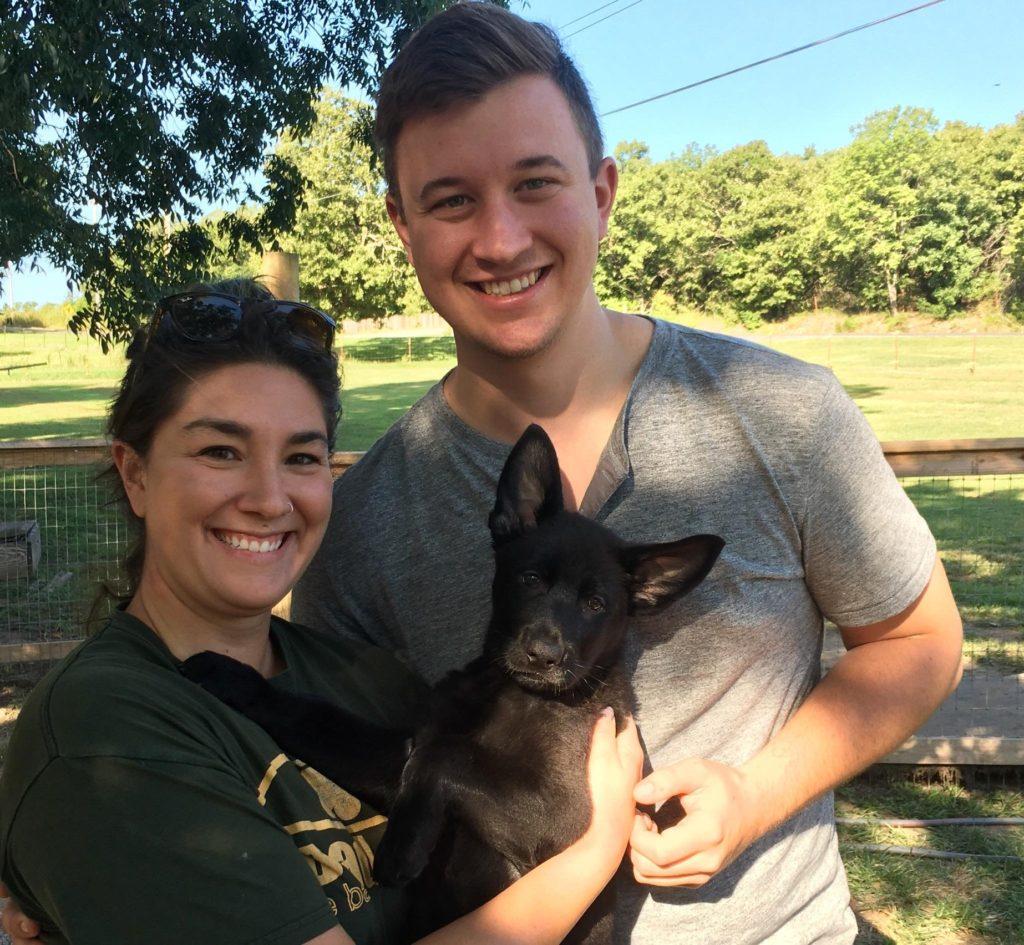
But often I can’t, and as our FB group Pandemic Puppy Raising Support Group grows and grows, nearing 10,000 as I write this, I am seeing some common problems faced by new puppy owners that could have been prevented, or decreased, if they had known how to find a breeder who valued some simple “ease of living” skills and traits. This is important because for puppies to have a good long term outcome, avoiding losing their homes, or being shuffled from one home to another, there are some really important things for people to consider BEFORE they purchase and bring home that puppy.
I didn’t want to make this another “how to find a good breeder” post because there are just so many of those out there, some are good, some are very good (but still want you to choose a rescue over a breeder), some are great, and some not so great, and to be honest they often fail to mention things that are actually really important to the average dog owner. So I’m hoping my view on how to find a puppy has not only a different point of view, but also very actionable steps.
The most important thing to remember about purchasing a puppy (from a breeder, rescue, or shelter) is what you really need to focus on are shared values. Finding a breeder who values the same things you do sets everyone up for long term happiness.
Here are some things I find are valued by most puppy seekers, and also by most responsible and ethical breeders, fosters, and shelters. Some of these apply only to breeders, but many will apply to fosters and rescues as well.
- Want the quick version? Look for “In a Nutshell”
- Want a more in depth explanation? Look for “By the Bushel”
- Want to know what to avoid? Watch for “Bad Apples”

Value 1: Long Term Health:
In a nutshell: Do you value owning the healthiest adult dog possible? If so find a breeder who values producing healthy dogs and knows how to do this work.
By the bushel: How to find a breeder who values health.
Start here: Go to the OFA website (www.ofa.org) and click the link for “health testing by breed” and find the breed, or for mixes all involved breeds, you are considering. For example, Border Collie and Whippet for a Border Whippet cross, or Golden Retriever and Poodle for Goldendoodle. Once you find this list, screenshot it. Be sure to note which tests are DNA tests, which tests are a medical evaluation, and which tests are recommended versus optional for your breed.
After That: Click each condition and read about it, and how, and how often, breeders screen for it. This is really important, if you don’t have a rudimentary understanding of how these diseases are screened for you won’t know what to ask the breeder, or how to know if you are being misled. Further, If you really want to understand this work, find and read the “best practices” for breeders content on the OFA website and then ask the breeder questions about not just the health screening but also their over arching plan for preventing or reducing the chance of such diseases occurring in the puppies they produce.
The Bad Apples (Avoid these breeders if you want a healthy dog).
A HUGE NOPE! Those who do not do the recommended health testing for the breed, or breeds. Period, end of story.
Caution! Beware breeders who do DNA testing and say “ Dog is tested and cleared for over 100 genetic diseases.” This is a deception. The big DNA panels include MANY tests that do NOT apply to all breeds, for example for the GSD only about 12 of the 100 plus tests actually apply to the GSD! And our most common health problem, hip and elbow dysplasia, cannot be identified via DNA test AT ALL! Breeders who imply that their dogs are “clear” of a hundred plus diseases when only a handful apply to their breed are misleading you, breeders who mislead people are either extremely ignorant, or deceitful, and neither shares your value of honesty.
Bad Apples: Breeders who don’t follow guidelines for health evaluations, for example, a breeder who does OFA Preliminary Opinions (or worse the “my vet says” hips are ok thing) on hips/elbows instead of OFA Certification, or a breeder who does an OFA cardiac exam via auscultation when ultrasound evaluation is the standard, or a breeder who has a general practitioner “check” eyes when a veterinary ophthalmologist is required for certification. Take time to read about each disease, and how it should be screened for, and use caution if a breeder seems to be doing half measures.
Take your list of tests from the OFA website and only consider breeders who can talk to you intelligently about these diseases and how they are inherited, how they are screened for, and how the breeder uses that information. Take notes and talk to several breeders to help you identify red flag behavior.
Do not complain about your adult dogs health problems if you did not purchase from a breeder who has a solid plan for breeding for health!

Value 2: Bringing (and sending) home a healthy puppy.
In a Nutshell: Another value you and your breeder should share is sending home the healthiest puppy possible
By The Bushel:
While producing long term health is about the health of the dogs in the pedigree, sending home healthy puppies is about puppy raising health practices and protocols. You will find that these protocols are different between breeders based on their own experiences, belief systems, and veterinary advice. There doesn’t need to be one “proper” way of raising healthy puppies, but YOU do need to be comfortable with your breeders protocols. One good way to evaluate your comfort level is to discuss these protocols with the breeder, and your own veterinarian.
Preventive health care, even if excellent, will not guarantee a puppy will not become unwell in the new home, puppies are prone to a variety of illnesses, so many responsible breeders will enroll in programs that provide their puppy owners with a complementary 30 days of health insurance policy (sometimes called an “offer”) and if you choose an puppy eligible for AKC registration it’s also eligible for the AKC policy.
Typical health care for puppies:
- Preventive worming for intestinal parasites.
- Vaccination against infectious diseases (often done by vet)
- Flea/tick prevention.
- Heartworm Prevention.
- Veterinarian Well Puppy Checkup before send home.
- Fecal Exam (ideally an ELISA Antigen test)
- Cardiac exam via auscultation or ultrasound (if warranted)
- Eye, mouth, ear check.
- Abdominal Palpation and check for umbilical/inguinal hernia.
- Evaluation of body condition, skin and coat health.
- Normal body temperature, respiration rate.
- Health Certificate (if needed for travel).
Caution: Breeders who do not do typical preventive care. If a breeder does not do preventive care, this warrants further discussion, there may be a good reason. Perhaps a particular disease is not active in their area (such as heartworm, fleas, or ticks, in some geographical areas, or their breed/line is sensitive to common preventive medicines. While lack of preventive care may be a red flag, there may also be a very valid reason for the lack of certain types of care. Politely ask the breeder they why behind their choices, and then run that information by a trusted veterinarian, once you have all the information you can decide if you are comfortable with the risk/benefit involved.
Bad Apples: Avoid a breeder who does not do any preventive health care at all, or who omits typical health care without any valid reason. Avoid any breeder who places a puppy too early (prior to 8 weeks) or without a well puppy check by their veterinarian.
Healthy puppies are raised in clean environments.
Those who value healthy puppies maintain their puppies in clean, sanitary, environments. You are looking for a breeder who understand the importance of cleanliness and has the skills to maintain their puppies in a clean puppy raising environment.
Observe: Look for a breeder who is transparent about where and how puppies are housed. Most breeders maintain social media pages, websites, or even webcams and this is an excellent place to observe the living conditions the puppies are kept in. Expect some degree of transparency. What should you look for?
- Look for clean bedding, while puppies do potty a lot the breeder should also keep areas clean, so a poop is ok, but lots of poop is not. It should be obvious the breeder cleans up after puppies frequently.
- Look for absorbent footing with traction, so puppies are not walking and laying in urine.
- Look for a litter box, so puppies are not forced to walk about in their own waste. Litter Box trained puppies are cleaner.
- Outdoor areas should be free of dirt, with a surface that can be sanitized, kept clean and as free of feces as possible.
- Do NOT expect a pristine environment, puppies are messy, but DO expect cleanliness and obvious regular and complete cleaning of puppy areas.
- Puppies should appear clean in photos and on webcams, and smell and feel clean in person.
Bad Apples: Avoid These Breeders!
Avoid breeders who refuse to discuss or provide examples of where and how puppies are raised or breeders whose puppies are obviously kept in dirty environments, cramped conditions, or cage like kennels.
Value 3: Ease of House Training
In a Nutshell: Everyone wants a puppy who is easy to house train and nobody wants a dog that soils the house long term. In fact, one of the leading reasons owners often give for relinquishing their dogs to shelters is house soiling. For this reason good breeders value ease of house training as much as puppy seekers. This is one area where good breeders and good dog owners agree, an easy to house train puppy that grows into a house trained adult dog is the gold standard. What makes a puppy easy, or hard, or impossible to house train? Two things, early puppyhood learning and the house training plan, or lack thereof, in the new home.
By The Bushel: What puppy raising practices make house training easier.
- Keeping puppy pen clean and free of feces.
- Keeping puppies themselves clean and free of urine or feces.
- Keeping puppy bedding, crates, and toys clean.
- Litter box training started early. Litter boxes kept clean.
- Avoiding “pee pads” in litter boxes, using grass, pellets, or shavings instead.
- Access to an outdoor area, when safe and weather permitting, so puppies can experience relieving themselves outside.
- Breeder observing puppies going potty, so puppies are used to someone watching them void BEFORE they go to the new home.
- Even better, if the breeder is rewarding puppies for going potty in the litter box, or outside, with treats and praise.
- Even Even better, if breeder teaches puppies a “go potty” cue.
- Keeps puppies a bit longer, because a slightly older puppy (9-16 weeks) will have more bladder and bowel control.
Bad Apples: Things that make house training harder.
- No litter box training meaning puppies relieve themselves thoughtlessly and everywhere.
- No Litter Box Training: Puppies end up resting, walking, and playing in and around their own waste and learn this is normal.
- Infrequent clean up means puppies normalize being around waste.
- Dirty puppies: Puppies learn that having waste residue on their body is normal.
- Breeder never observes puppies going potty means puppy may be unsettled, even scared, when the new owners start staring at Puppy on potty breaks.
- Breeder punishes puppies for going potty in some locations.
- Breeder uses pee pads for the toilet area, meaning puppy thinks fabric is a toilet.
- Puppies never have access to voiding outdoors.
- Puppies are house in small kennels, so puppies think crates are ok places to void.
- Puppies are placed too young, before the age of 8 weeks, or when still quite immature (rate of maturity varies by breed!)
Value 4: A well socialized and confident puppy.
In a Nutshell: Another area of agreement between responsible breeders and responsible puppy seekers is socialization. We know that early puppyhood socialization, starting around 21 days, is vitally important for the long term behavioral health of dogs. Those who breed dogs want to send home happy and well socialized puppies, and puppy seekers want puppies who have been socialized well and who are most likely to grow into pleasant and adaptable companion dogs.
In a Bushel: What to look for.
- Breeder uses a well defined and evidence based puppy raising protocol (such as Puppy Culture).
- Breeder raises puppies in the home, or a home like setting.
- Breeder prioritizes the emotional health and wellbeing of puppies.
- Breeder provides an experience rich environment that is changed regularly, so puppies are not bored, and have an enriched environment.
- Breeder makes the most of the 3 week to send home “socialization” window.
- Caregivers have positive and predictable interactions with puppies frequently each day.
- Novel people are introduced to puppies at safe and appropriate ages.
- Novel people interactions are fun, predictable, and pleasant for the puppies.
- Food is used for all teaching and training, ensuring puppies are having fun.

Snuffle mats build problem solving skills 
Metal snuffle mat creates puppies confident with sounds. 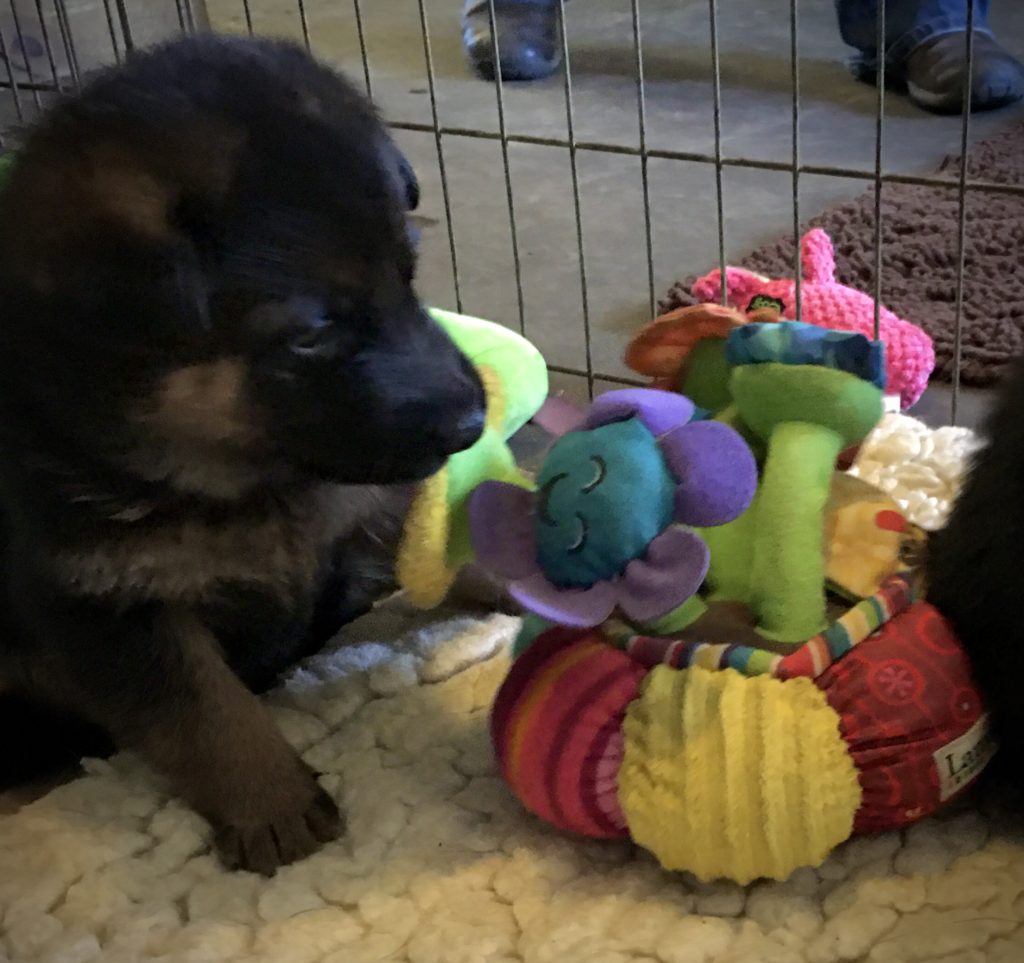
Music toy builds confidence with sound and light. 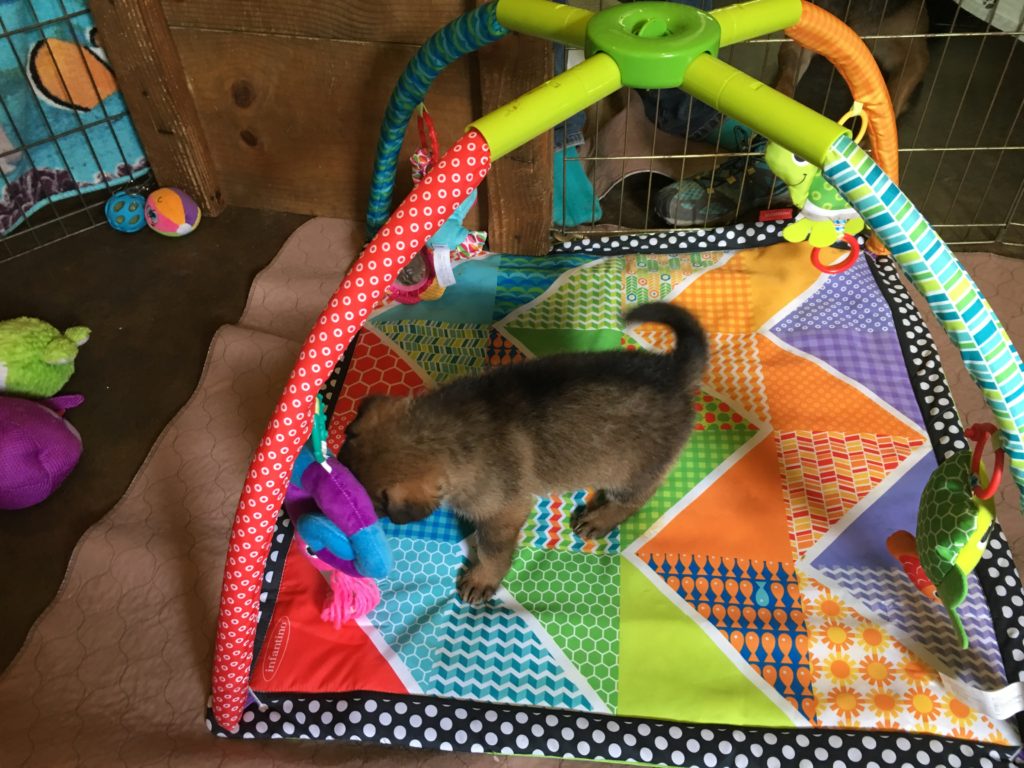
Mobile teaches puppies to love novel things. 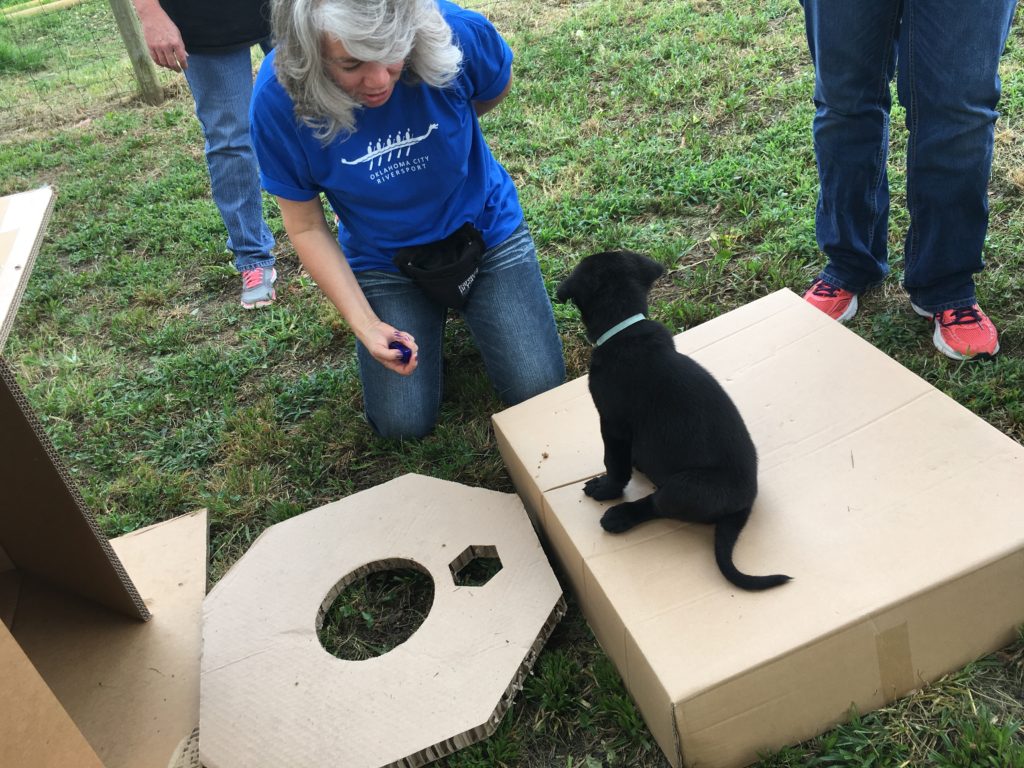
Practicing sit with a novel person teaches puppy people are predictable and fun. 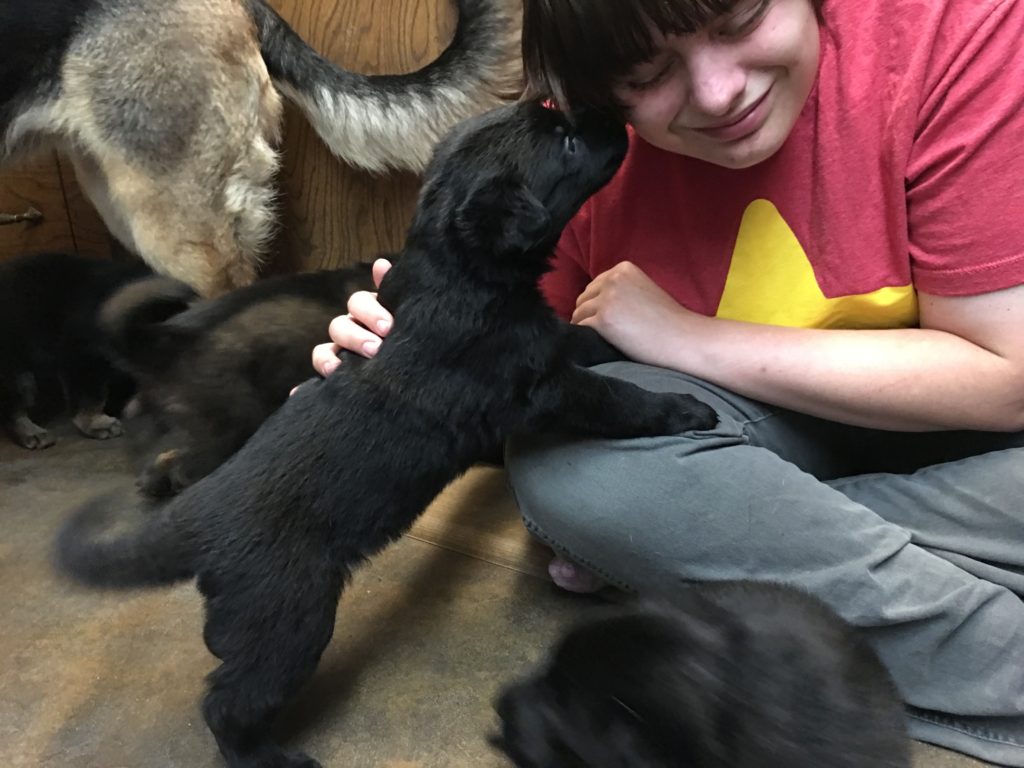
Emotionally positive interactions with caregivers creates trusting dogs. 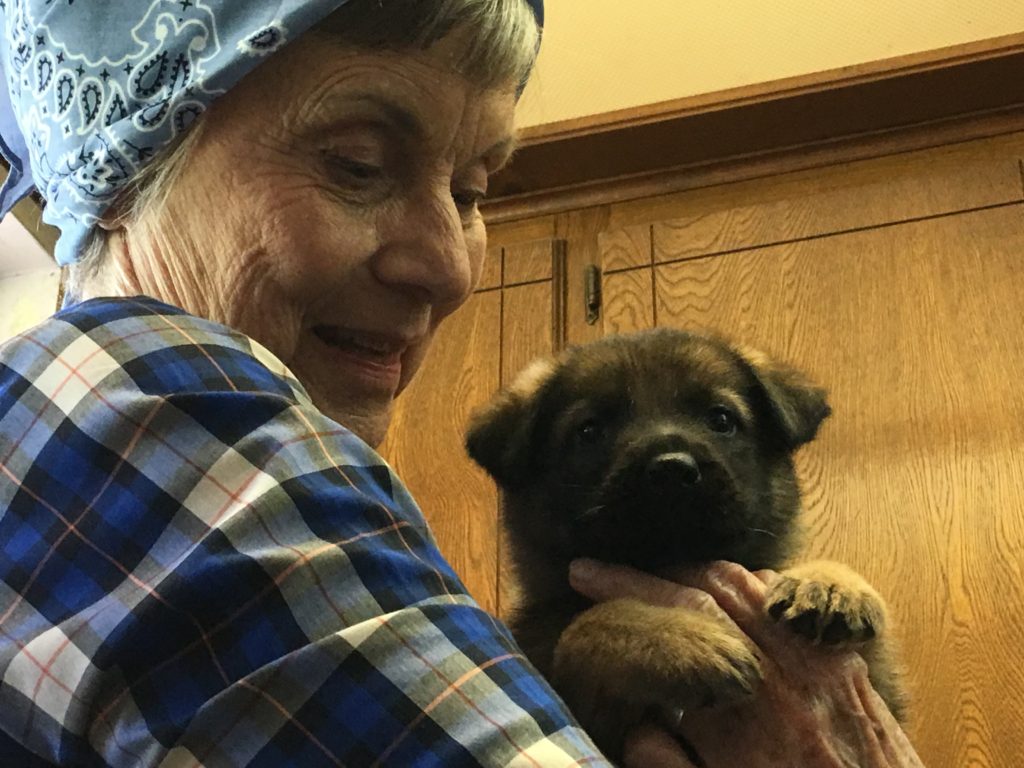
meeting novel people of different ages helps puppies be adaptable. 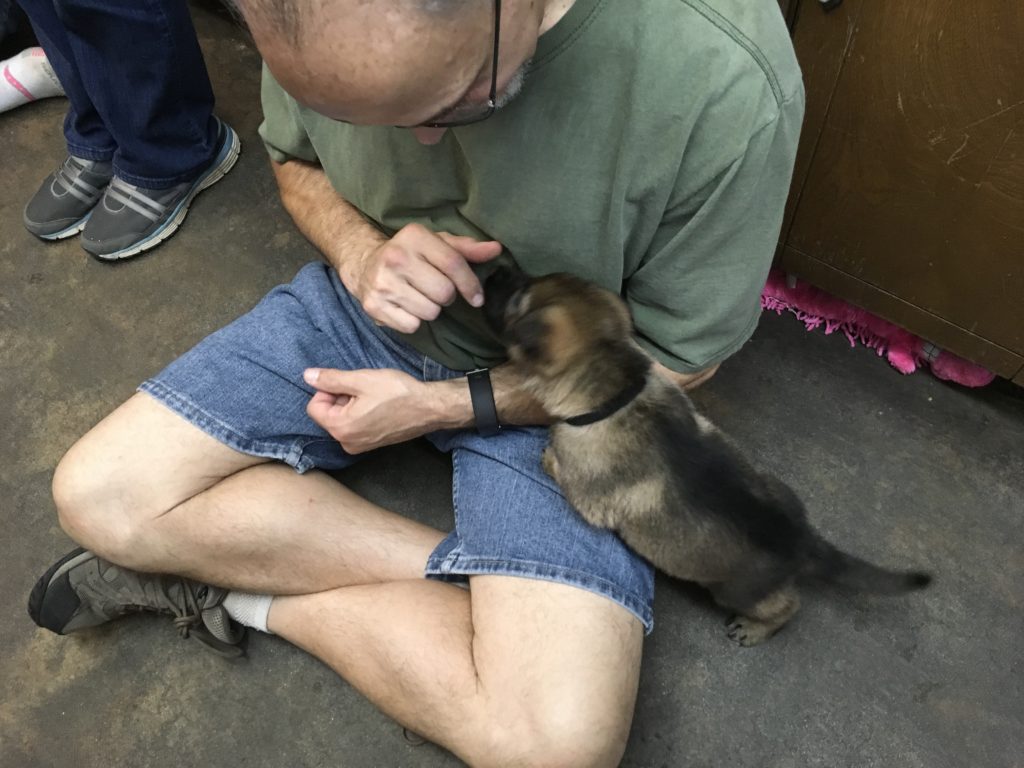
Positive interactions with novel people builds confidence. 
Learning new things with a novel person builds trust that people are predictable. 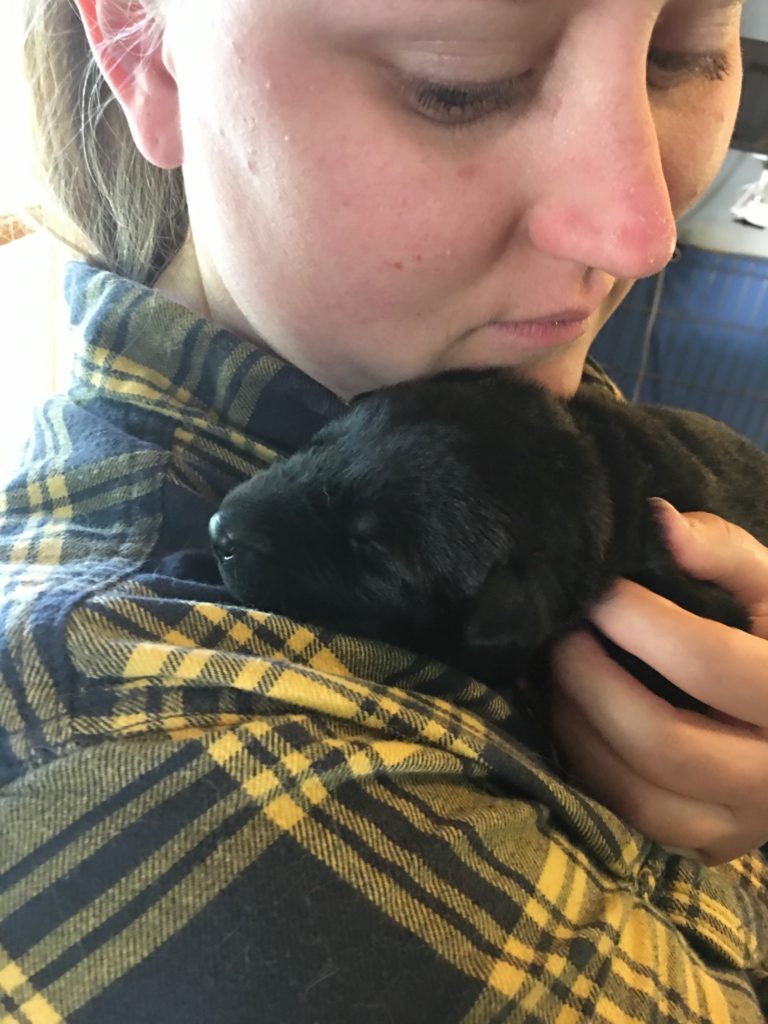
Early exposure to novel people creates confidence. 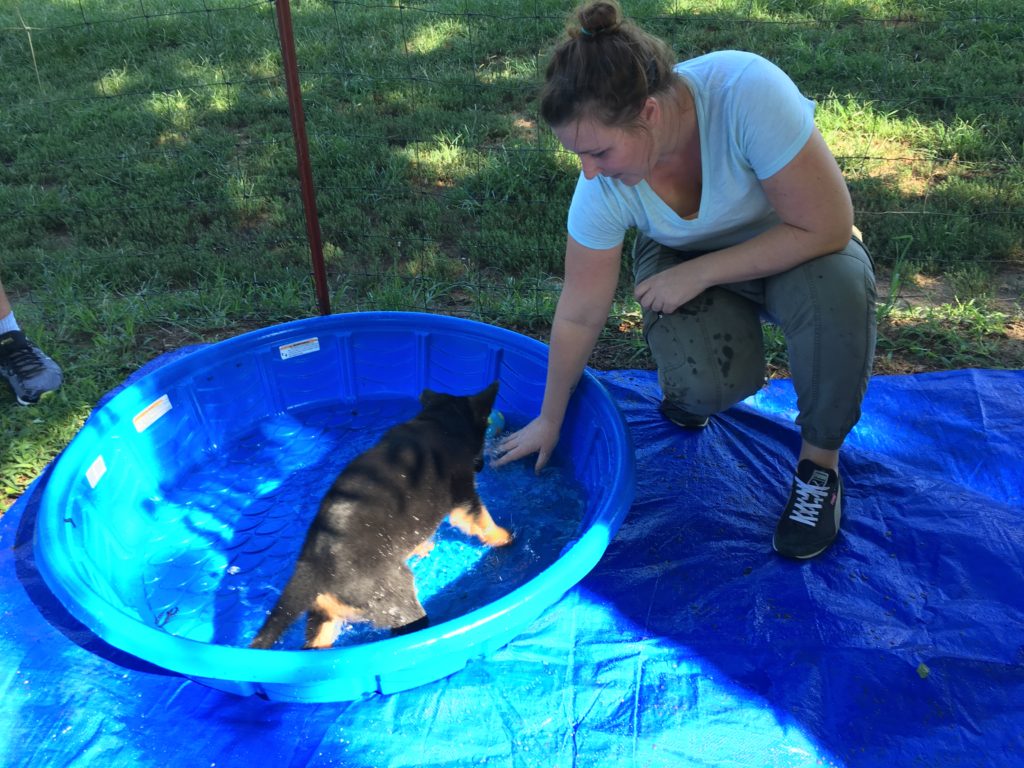
New and fun experiences with novel people creates confident dogs. 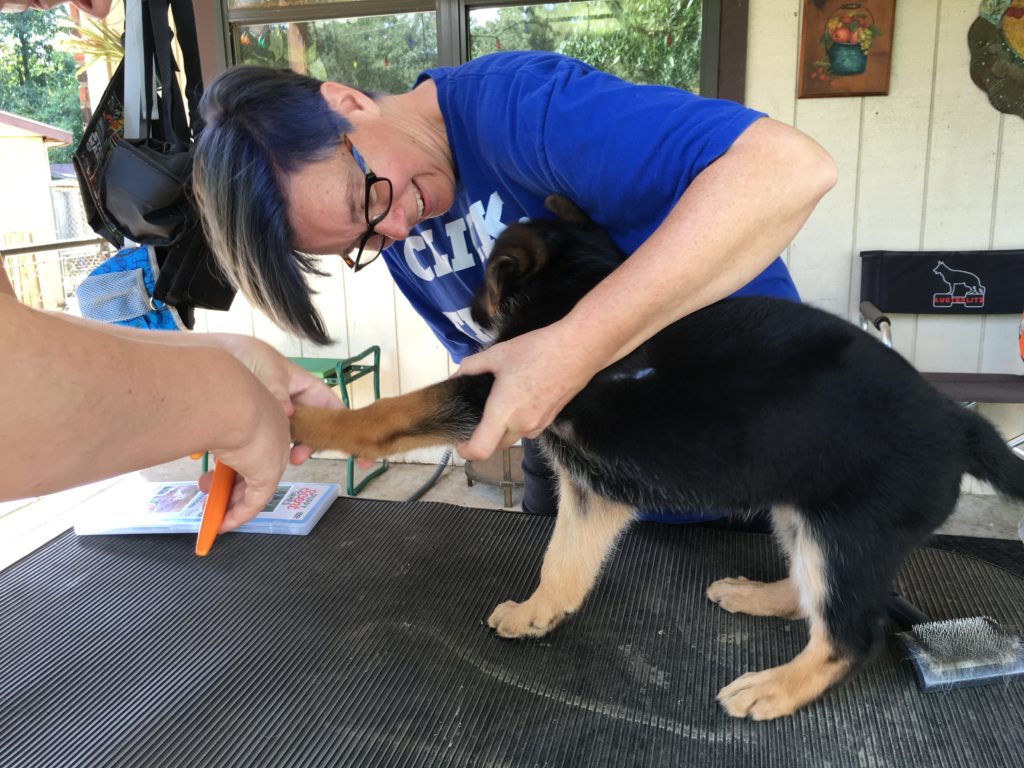
Having fun, and treats, while having your nails trimmed teaches puppies being touched is good. 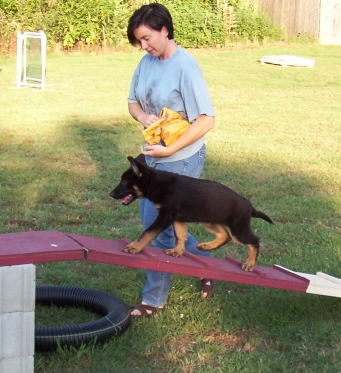
Opportunities to earn treats for being brave builds brave dogs.
Bad Apples: Lack of socialization, or “bad learning” can have lifelong negative effects on a dog’s behavior, intelligence, and personality.
- No well thought out plan for socialization.
- Very little interaction with caregivers.
- Scary interactions with caregivers.
- Caregivers who use punishments (physical or mental) or who are using outdated “dominance” or “alpha” techniques on puppies.
- Caregivers who trap the dam in with puppies, forcing the dam to resort to biting, growling, and other punishments to protect herself from her puppies.
- Lack of socialization with novel people.
- Scary interactions with novel people.
- Boring, bland, unchanging environments.
- Breeders who place puppies too early, prior to 8 weeks, or too late, after 16 weeks.
Value 5: Puppy is easy to crate train.
In a Nutshell: Crate training is a valuable skill for dogs. Puppies who enjoy confinement are easier to house train (see Value 2), travel with, and care for if unwell. Puppies who have some positive associations with crates are easier for the new owner to crate train, and this means a happier puppy, and a happier family, during transition week. Easier transitions facilitate bonding, and prevent a plethora of behavioral pitfalls.
By The Bushel: Breeders can, and should, do some exposure to the crate, but not all exposure to the crate and confinement is positive for puppies or leads to a puppy who is comfortable being confined. Puppies must have positive exposures to the crate, and not scary or upsetting ones.
- Has crates open and accessible in the puppy pen.
- Has comfortable beds in crates, so puppies learn that crates are good for resting.
- Feeds puppies meals, snacks, or chews in the crate.
- Gives puppies treats for entering crates.
- Ensures the crate is a fun and safe place to be.
- Uses a positive reinforcement based crate conditioning plan like my own Crate Conditioning For Breeders and Fosters Blog and Course.
- Place puppies who are slightly older, between 9-12 weeks.
Bad Apples: avoid breeders who…
- Lock puppies in crates and leave them to “cry it out”
- Punish puppies who vocalize when confined.
- Allow puppies to learn how to climb out of puppy pens or escape from crates.
- Allow puppies to scream or run along the side of the pen.
- Place puppies too young, prior to 8 weeks.
- It’s BETTER for breeder or foster to avoid any crate work at all than to teach puppies that crates are scary or unpleasant places to be.
Value 6: Ongoing Support
In a Nutshell: Responsible breeders want to help you, and you will need help.
By The Bushel: If you value having an ongoing relationship with your breeder choose a breeder who values having an ongoing relationship with you. It’s important for the long term success of your puppy that you have the support you need, for that a positive and productive relationship with your breeder will be vital. The breeder should treat you with kindness and respect, and you should treat your breeder with kindness and respect as well.
Bad Apples: Avoid a breeder who does not make it easy to stay in contact. Look for Facebook pages, Facebook Groups for puppy owners, websites, and other ways of keeping in contact. The absence of easy routes of communication should be a red flag. Avoid breeders who “blame” others for problems that occur, or who seem unwilling or unable to communicate or help you. Breeders who blame clients, “rant”, and otherwise seem frustrated with their puppy owners are a red flag.
Value 7: Standing Behind Their Puppy and Realistic Expectations.
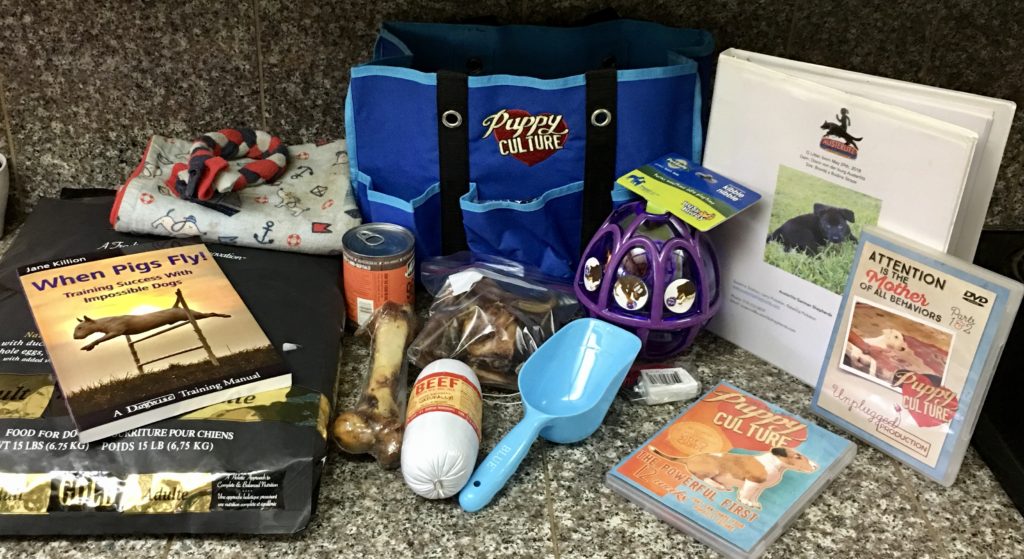
In a Nutshell: Look for a breeder who has a written warranty/contract that reflects their values AND your values. Do not expect your breeder can guarantee a good outcome, perfect health, or behavior, or that a contract releases you from your own responsibility to do a good job with your puppy.
In a bushel: Contracts/warranties are a sticky subject but suffice it to say you should read and agree to all terms of the contract BEFORE signing it or paying any money. Do not agree to any contract stipulation you cannot happily accept. The breeder should discuss each clause, disclose any MLMs or affiliate programs they are requiring you to participate in, and answer any questions you have. Remember, the contract should be agreeable to both parties, it provides the framework for the breeder to stand behind the puppy they sell, and it outlines buyer responsibilities too. There are few “right” or “wrong” things, there are lots of points of agreement and disagreement, just ensure you are comfortable with the contract before signing it. If the puppy you are purchasing is quite expensive, more than a couple thousand dollars, or you are looking for a show, sport, or breeding dog it may be worth considering having an attorney review the contract and explain it’s terms to you, before signing. Once signed, be a respectful client and abide by the terms you have agreed to.
Bad Apples: Avoid any breeder who does not have a written warranty/contract. Avoid a breeder who demands you agree to stipulations you cannot happily agree to. If you do not want your breeder to come between your veterinarian and your dog, don’t agree to take your breeders medical advice over that of your vet. Don’t want to buy supplements, foods, or training that your breeder wants you to agree to buy via an MLM or affiliate program? Then don’t agree to do that. Whatever you agree to is between you and your breeder, so be sure that you actually agree, otherwise don’t purchase that puppy. Avoid any breeder who will not discuss the contract openly and allow you to preview it, or whose contract is overly restrictive to the point you are not comfortable agreeing to it.
Value Last and Most Important
In a Nutshell: Find a breeder who is producing the traits that are important to you. Are you looking for a companion puppy for your family, look for a breeder who values companion dog homes, and understand the traits a pleasant companion needs to have. Want a show dog? Look for breeders who show successfully. Looking for your next agility prospect? You need a breeder who values the traits needed to excel in agility.

By the Bushel: Here is a little known secret of dog breeding. Breeders apply selection pressure for traits, both behavioral and physical, that are important to them. Sometimes this means the traits you value and the traits the breeder values will match up, sometimes they won’t match up, and that’s ok. Don’t feel it’s only OK to get a puppy from one type of breeder. Look for a breeder whose values align with yours. Sometimes there will be crossover, and a great companion dog may come from a “show” breeder, but let’s face it, there are not enough “show” or “sport” breeders to even come close to meeting the demand for responsibly bred dogs, this can mean waiting lists are very long, and pet puppy seekers are usually lowest on those lists. Same for sport bred dogs. Additionally, it’s a falsehood that all show dogs or all sport dogs are easy companion dogs, many are not, and some breeders of show or sport dogs are so detached from the needs of the typical companion dog owner that they cannot really say they understand what traits a companion dog needs.
So don’t hesitate to enquire about a puppy from a show or sport breeder, but don’t overlook the companion dog breeders. Unlike show and sport breeders the FIRST consideration a companion dog breeder has is making healthy and pleasant companion dogs, for working and show breeders these considerations come after structure or working ability. Don’t believe the falsehood that show and sport breeders are the only responsible breeders, because that’s not accurate, and don’t believe the falsehood that companion dog breeders are always unethical.
If you are looking for a companion dog you are clever for seeking out a breeder who values companion homes, who understands what traits are needed to be a companion dogs, and who produces those consistently.
Do you want a pet that is good with your other dogs? Then be sure to talk to the breeder about if their their pedigree has dogs who are safe and tolerant of other dogs. Have children, be sure to make sure the breeder knows if their dogs are tolerant of children. Want to take your dog to work, be sure the breeder produces gregarious dogs. You get the picture right? Think about how you want to live with your dog and make sure the breeder understands those needs and the traits that go along with them.
If the breeder says their dogs won’t be a good match, believe them!
If you’re are looking for a companion dog for your family.
- Choose a breeder who can discuss with you exactly what traits they produce that make their dogs good companions.
- Don’t be afraid to ask what traits they think you need for your lifestyle and situation.
- Choose a breeder who is interested in you and asks for lots of info about your life, family, and lifestyle.
- Choose a breeder who keeps their dogs in their home and who raises their puppies in their home.
- Avoid a breeder who makes it apparent their interest lies mainly in show or sport dogs.
- If a breeder talks extensively about structural traits, or working traits, titles, scores, wins, and has little information for you about what the dogs are like to live with, avoid this breeder.
- If the breeder considers pet homes as lesser, places them lower on selections lists, or talks down to you about “just a pet” avoid this breeder.
- Avoid a breeder who does not live with their dogs and who kennel raises their puppies exclusively.
If you are looking for a show prospect puppy.

- Look for a breeder who produces dogs that finish easily with owner handlers.
- Look for a breeder who is willing to mentor you.
- Ask the breeder if the puppy can be purchased on full registration, and if so, what are the requirements.
- Avoid a breeder who is not producing dogs that finish easily with owner handlers (unless you want to pay for professional handling).
- Avoid a breeder who is unwilling to mentor or support you while you show your dog.
- Avoid a breeder who has outlandish contractual obligations for obtaining full registrations, or breeding your dog if it finishes.
If you are planning on competing in dog sports.
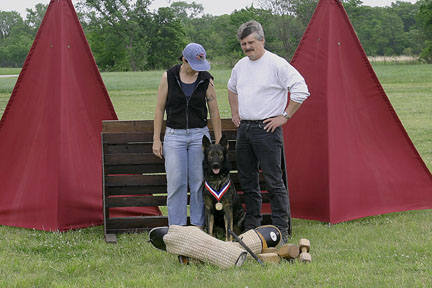
- Choose a breeder with a history of producing dogs that make title in the sport of your choice.
- Choose a breeder who is willing to mentor you in puppy raising and training.
- Avoid a breeder who has no history of producing dogs that make title in the sport of your choice.
- Avoid a breeder who is unwilling to mentor or support you as you compete with your dog.
I hope this blog has been helpful and has given you many things to consider, many things to discuss with your breeder, and the best chance of finding a fantastic breeder who will have the puppy of your dreams waiting for you.
And of course, if you are considering adding a German Shepherd Dog to your life please Contact Us or learn more about what sets us apart or our Puppy Purchase Process.

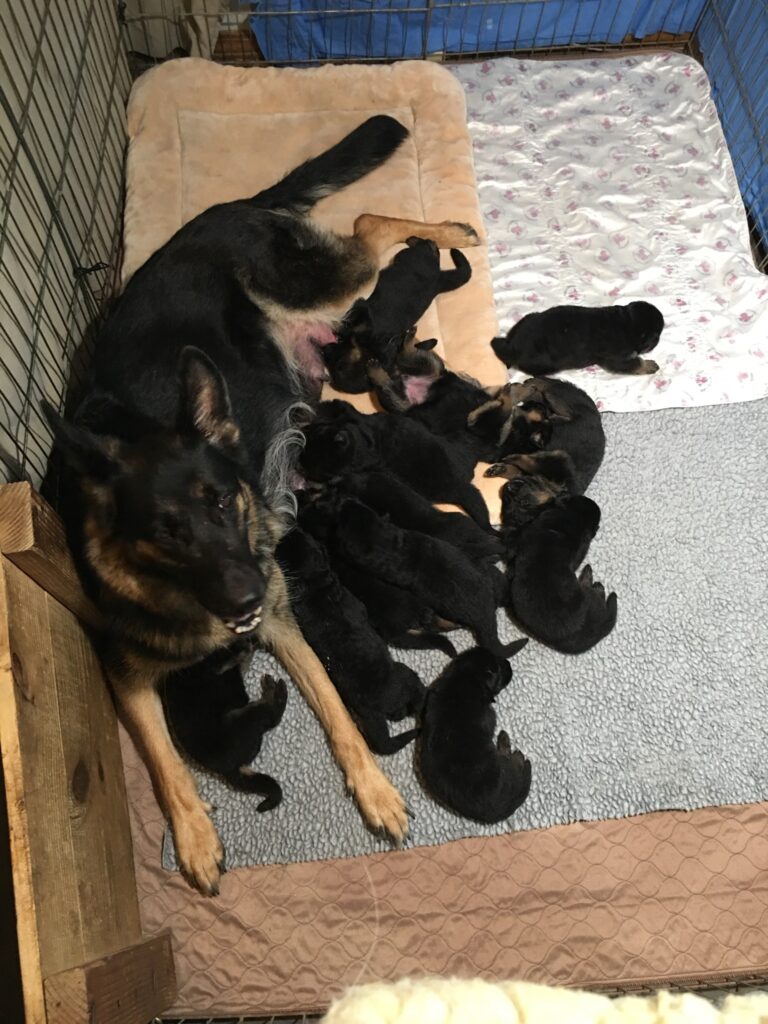
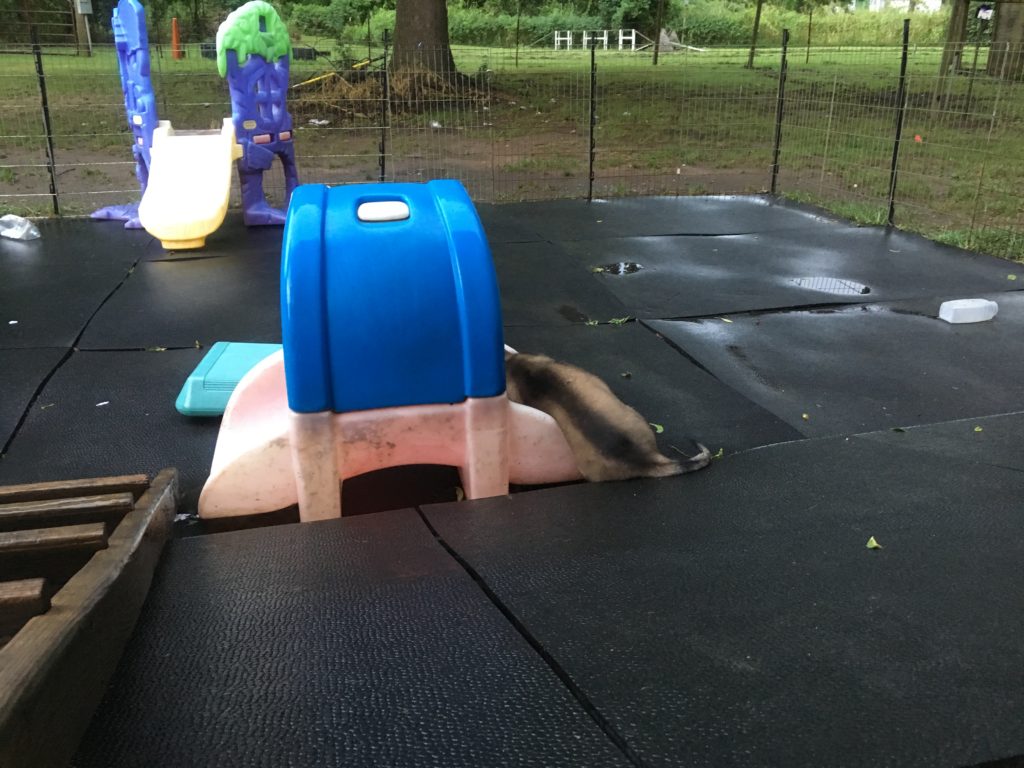

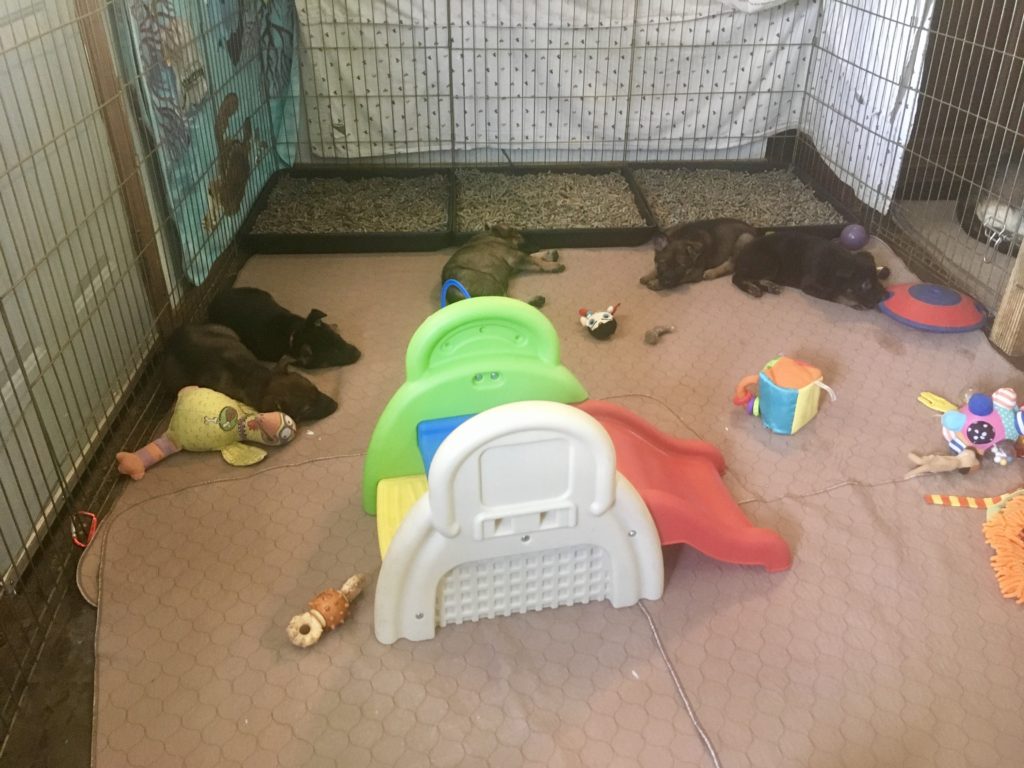




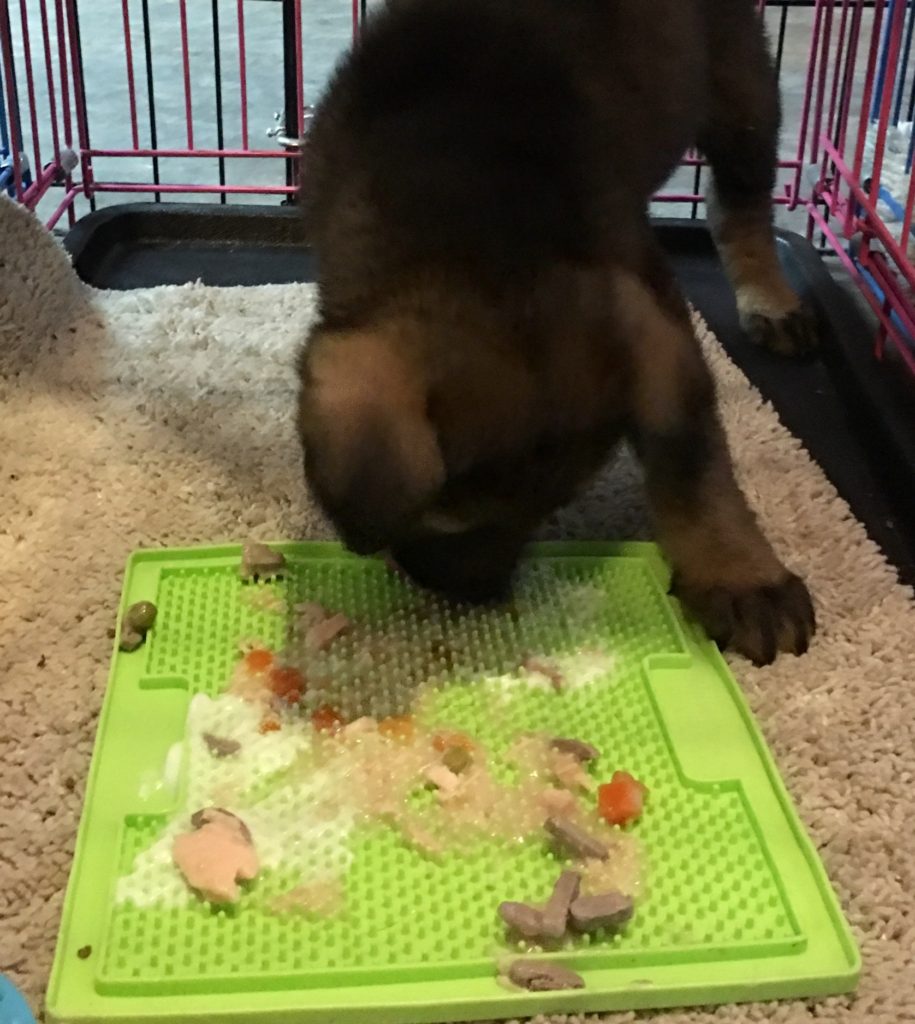


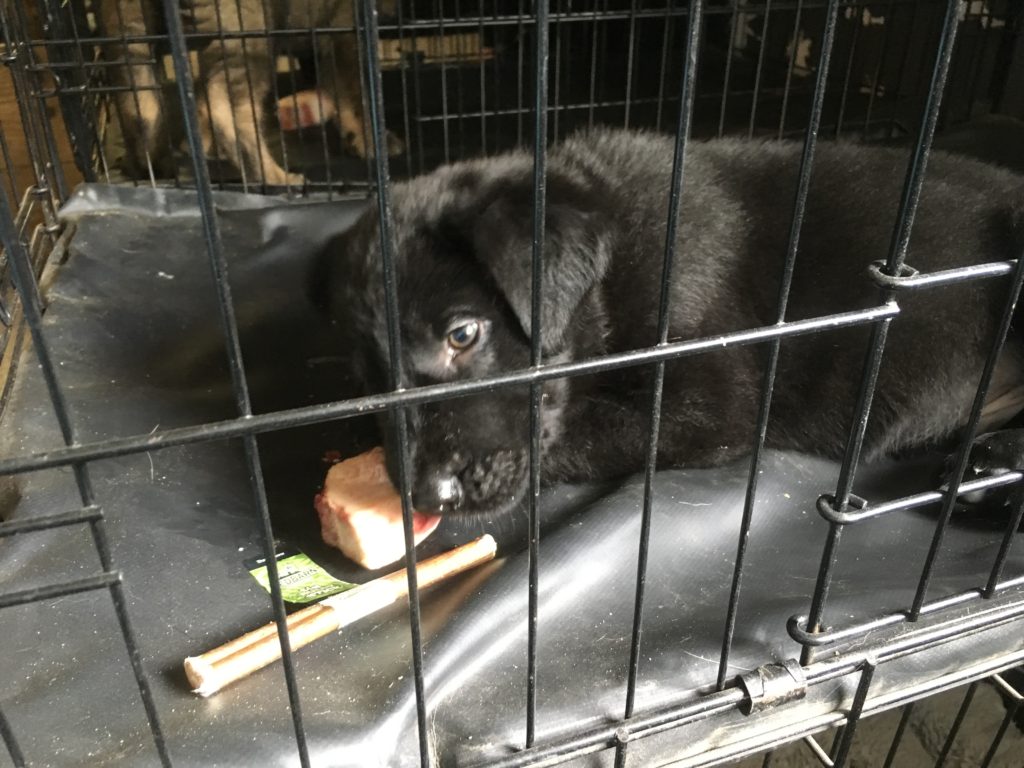
Thank you so much for that information. I’m happy to say it was our breeder that introduced us to this group. She and this group have been a wealth of information. I’m so grateful for her!